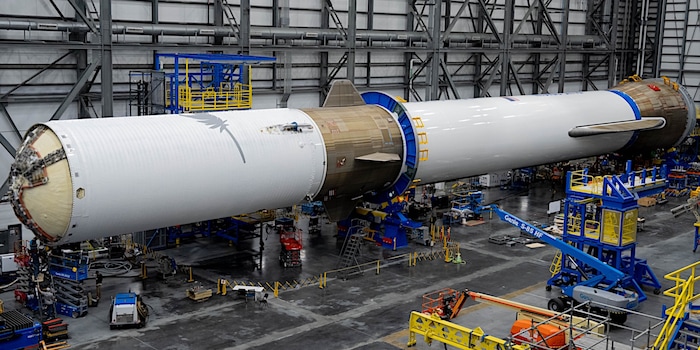
Jeff Bezos' first heavy-lift rocket "New Glenn" is scheduled to launch on 16 January at around 7 a.m.
These are exciting days for Jeff Bezos' space company Blue Origins: his new rocket "New Glenn" is launching its first cargo mission. It is to earn its spurs in medium Earth orbit for future cargo flights for the US Department of Defence.
Billionaires and their rockets: Elon Musk's company Space X has been successfully completing space missions for some time now. Jeff Bezos, founder of Amazon, is still lagging a little behind with his company Blue Origin, but now wants to follow suit with the heavy-duty rocket "New Glenn". With this first mission of the rocket, called NG-1, Blue Origin wants to secure approval for future flights for the US Department of Defence and thus lucrative contracts.
The launch of "New Glenn" was initially scheduled for 10 January, but was then postponed several times due to adverse weather conditions. Now there is to be a new opportunity in the early morning of 16 January. Blue Origin announced on X that a three-hour launch window will open at 6am UTC. In Central Europe, that means 7am. "New Glenn" could take off in these three hours, provided the weather co-operates and no technical problems arise. Blue Origin will provide information on X. A livestream will be available on the company's website and on YouTube.
Mission profile of NG-1
"New Glenn" is Blue Origin's second spacecraft and was developed to transport particularly heavy cargo, especially with a view to future lunar missions. Blue Origin has been working on the design of the rocket since 2012. It is intended to offer a significantly larger payload volume than other rocket systems.
The rocket is to be launched from Cape Canaveral in Florida. After a few minutes, the first rocket stage, known as the main booster, will be separated. Like the SpaceX boosters, this is reusable and is intended to land independently on a floating platform in the Atlantic. The second rocket stage with the payload will take the cargo capsule into medium Earth orbit. There, the capsule will open up so that tests can be carried out with the "Blue Ring Pathfinder". This is a prototype developed by Blue Origin for a future platform that will be used to position other satellites in orbit.
Blue Origin is also working on making the second rocket stage, which can currently only be used once, reusable. This could save the company a lot of money on future launches of the rocket, as almost the entire engine could be used for further missions.
Blue Origin becomes a competitor to Space X
Bezos and Musk are among the richest people in the world and both have a soft spot for space. Bezos founded Blue Origin back in 2000, Musk followed two years later with Space X - both before their major commercial successes with Amazon and Tesla. Space X is ahead of the game: the company successfully flew astronauts to the International Space Station (ISS) back in 2020. Its employees work with NASA, ESA and other space agencies.
Blue Origin completed its first manned flight in 2021 with its first rocket design, the New Shepard. On board the rocket were Jeff Bezos himself, his brother and two paying passengers. The flight into suborbital space lasted around ten minutes. There was no pilot on board; the spacecraft took off, flew and landed completely automatically.
To date, no Blue Origins rocket has docked with the ISS and no commercial cargo flights have been carried out. However, the company wants to change this with "New Glenn".
Night report: "New Glenn" actually took off a few minutes after 8 a.m. and stage 2 with the cargo capsule reached the desired orbit. However, stage 1 was lost: the livestream still showed the ignition of the booster to decelerate on re-entry into the atmosphere, but then cancelled and the data displayed, such as altitude and speed, froze. A little later, the presenter confirmed the loss of the booster. What caused it not to land on a platform as expected was not yet clear at the time.
Follow-up: Starship from Space X also has a partial success
Less than 24 hours after the launch of New Glenn, a Starship rocket from Space X also lifted off for its seventh test flight. Starship is the largest rocket launcher system ever developed in the world. Space X achieved what Blue Origin was denied this time: The lower stage of the rocket returned safely to Earth and landed back in the rocket's launch tower in Boca Chica, Texas, barely seven minutes after take-off. This is the second successful landing of the rocket in this way.
Also in reverse to Blue Origin, however, Space X lost the upper rocket stage. The live transmission and the transmission of telemetry data were interrupted. Shortly afterwards, a spectacular swarm of debris could be seen in the sky. Space X confirmed that the stage had exploded and is still investigating the causes.
Feels just as comfortable in front of a gaming PC as she does in a hammock in the garden. Likes the Roman Empire, container ships and science fiction books. Focuses mostly on unearthing news stories about IT and smart products.
From the latest iPhone to the return of 80s fashion. The editorial team will help you make sense of it all.
Show all